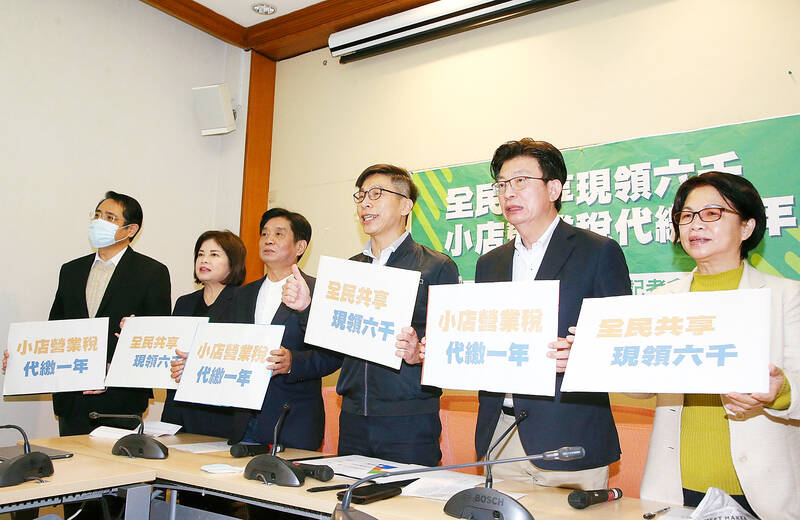The government should provide support for family-operated small businesses through tax exemptions funded by last year’s tax surplus in a bid to boost the economy across sectors, Democratic Progressive Party (DPP) lawmakers said at a news conference on Wednesday.
“We urge the Ministry of Economic Affairs (MOEA) to provide a tax exemption for small-scale business entities. This is a good way to use the NT$180 billion [US$5.91 billion] surplus tax revenue from 2022, alongside the plan for NT$6,000 cash rebates for every citizen,” DPP Legislator Chung Chia-pin (鍾佳濱) said at the Legislative Yuan in Taipei.
Chung, who is co-convener of the Legislative Yuan’s Finance Committee, said that mom-and-pop shops, family-run restaurants and other small businesses have suffered across the board from inflation, rising costs of materials and imports, price gouging by suppliers and intermediary distributors, and unreasonable rent increases.

Photo: CNA
Other DPP legislators present included Kuo Kuo-wen (郭國文), Wu Chi-ming (吳琪銘), Chiang Yung-chang (江永昌), Lai Hui-yuan (賴惠員) and Tang Hui-jen (湯蕙禎).
Small businesses should be eligible for a tax exemption due to the “Stimulus Plan 4.0” implemented by the ministry in 2021, they said.
About 440,000 small businesses applied for that COVID-19 relief package as they were hit by an economic downturn during the COVID-19 pandemic, but only one-quarter of applicants received funding, they said.
“At that time, the MOEA only disbursed NT$4.8 billion out of the allocated NT$36 billion,” Chung said. “We ask that government agencies better understand the hardships and severe conditions that small businesses have had to deal with in the past two years.”
In 2021, the total tax paid by small businesses came to only NT$2.85 billion, which was a much lower figure than previously, Chung said.
The MOEA should give relief directly to those 440,000 small businesses that had applied, and allocate NT$3 billion out of the NT$180 billion surplus tax revenue to fund their business taxes from the past year, he added.
“Doing this directly would not burden small-business owners, who would otherwise have to go to local district offices to file applications and face bureaucratic red tape. These people would immediately feel that the government is doing something for them,” he said.
“The government can bear the financial cost to grant tax exemptions for small businesses due to the surplus tax revenue from last year,” Kuo said.
“The MOEA would be seen to be spending the government budget most effectively on the real needs of society, and it would relieve financial pressures on many family-run stores,” Kuo said.
Since President Tsai Ing-wen (蔡英文) took office, tax revenue from businesses has steadily increased every year, Chiang said.
“In 2016, total tax revenue was NT$378.3 billion, and through 2021 it increased to NT$499.3 billion,” Chiang said.
“Despite these figures, small businesses have shown much lower growth over those years, caused by the economic downturn due to the pandemic, which led to a one-third decline on average for business taxes levied during this period,” Chiang said.

The Ministry of Economic Affairs has fined Taobao NT$1.2 million (US$36,912) for advertisements that exceed its approved business scope, requiring the Chinese e-commerce platform to make corrections in the first half of this year or its license may be revoked. Lawmakers have called for stricter enforcement of Chinese e-commerce platforms and measures to prevent China from laundering its goods through Taiwan in response to US President Donald Trump’s heavy tariffs on China. The Legislative Yuan’s Finance Committee met today to discuss policies to prevent China from dumping goods in Taiwan, inviting government agencies to report. Democratic Progressive Party Legislator Kuo Kuo-wen (郭國文) said

The Ministry of Economic Affairs has fined Taobao NT$1.2 million (US$36,900) for advertisements that exceeded its approved business scope and ordered the Chinese e-commerce platform to make corrections in the first half of this year or its license would be revoked. Lawmakers have called for stricter supervision of Chinese e-commerce platforms and more stringent measures to prevent China from laundering its goods through Taiwan as US President Donald Trump’s administration cracks down on origin laundering. The legislature’s Finance Committee yesterday met to discuss policies to prevent China from dumping goods in Taiwan, inviting government agencies to report on the matter. Democratic Progressive Party

Taiwan and its Pacific ally Tuvalu on Tuesday signed two accords aimed at facilitating bilateral cooperation on labor affairs, according to Taiwan’s Ministry of Foreign Affairs (MOFA). The governments inked two agreements in Taipei, witnessed by Foreign Minister Lin Chia-lung (林佳龍) and visiting Deputy Tuvaluan Prime Minister Panapasi Nelesone, MOFA said in a news release. According to MOFA, the agreements will facilitate cooperation on labor issues and allow the two sides to mutually recognize seafarers’ certificates and related training. Taiwan would also continue to collaborate with Tuvalu across various fields to promote economic prosperity as well as the well-being of their

Sung Chien-liang (宋建樑), who led efforts to recall Democratic Progressive Party (DPP) Legislator Lee Kun-cheng (李坤城), was released on bail of NT$80,000 today amid outcry over his decision to wear a Nazi armband to questioning the night before. Sung arrived at the New Taipei District Prosecutors’ Office for questioning in a recall petition forgery case last night wearing a red armband bearing a swastika, carrying a copy of Adolf Hitler’s Mein Kampf and giving a Nazi salute. Sung left the building at 1:15am without the armband and covering the book with his coat. Lee said today that this is a serious